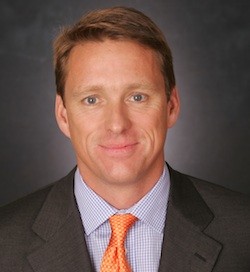
The worlds of OTC swaps and futures are coming closer together as a result of the Dodd-Frank Act and similar regulatory initiatives around the world.
“Our customers, as well as our customers’ customers, are trying to interpret Dodd-Frank in the context of market structure changes,” said Colin Heffron, CEO of financial intermediary GFI Group.

Colin Heffron, president, GFI Group
These market structure changes need to be taken in historical context. In the energy markets, for example, the transition from uncleared to cleared products took place more than ten years ago, following the Enron implosion.
“When Enron collapsed, market structure changed rapidly,” Heffron said. “All of our energy business transitioned to cleared products, and I expect we will see the same thing in credit and rates.”
The Commodity Futures Trading Commission is finalizing its rules for Swap Execution Facilities (SEFs), on which OTC swaps will be traded. Swaps can also be traded on designated contract markets (DCMs), i.e., exchanges.
“We would welcome the SEF rule, which we expect to see in about 90 days, because it will provide much needed clarity,” Heffron said. “The uncertainty that has existed up until now has taken up a lot of management focus, both for us and our customers. Building up a compliance capability means fewer resources available for new product and geographical development, so regulatory uncertainty has acted as a strong deterrent to volumes, market growth and innovation.”
Despite the growing pains associated with the changes in the market structure, the final outcomes will be worth the effort, with the goals being greater transparency and reduced systemic risk.
“Cleared products will bring more participants to the marketplace,” Heffron said. “Increased transparency will reduce systemic risk as well as boost volumes, leading to a more open marketplace.”
Heffron, who was appointed CEO this year, joined GFI Group in 1988 as a broker of foreign currency options in New York, before moving to London to assist in the establishment of GFI Group’s London office. He later headed the GFI’s currency options business, and from 1994 until 2004, ran the day-today operations of all GFI’s European businesses.
GFI has applied to the CFTC for a license to operate a DCM, and expects to file a similar request to operate a SEF.
“We applied for an exchange license because we want to be prepared to execute trades on either venue when regulations come out,” said Heffron. “There’s a potential that some products may only be executed on an exchange, and some products may only be executed on an SEF. We will be prepared to service our customers on both.”
On Wednesday, April 10, Dodd-Frank reporting and record-keeping rules for various types of trades not previously regulated or monitored come into effect for energy and utility companies.
“Many companies aren’t ready to report their trading activity to the swap data repositories (SDRs) set in place by DFA and could suffer fines for every day they fail to submit,” said Patrick Woody, senior strategist for regulatory risk compliance, is advisor to RiskAdvisory.
InterContinental Exchange (Ice) announced last year that all cleared swaps in energy products would be converted to regulated futures contracts on October 15, 2012, claiming that trading those products as futures will present significant advantages to customers seeking to avoid the impact of the Dodd-Frank Act.
All Ice cleared products are now listed by Ice as regulated futures. Ice no longer lists these contracts as swaps or as over-the-counter products, but offers the ability to trade them OTC via the EFRP (Exchange of Futures for Related Position) mechanism.
All CME cleared products are currently listed by CME as regulated futures. Some of those futures may be traded on CME Globex.
“This is the same process that we have been using to broker and submit cleared swap trades to CME ClearPort for over 9 years,” Heffron said. “So the futurization of the swaps market hasn’t dramatically impacted how we execute trades in our energy business.”





